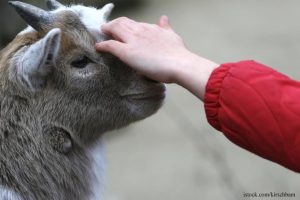The ongoing E.coli O157:H7 outbreak linked to the Zerebko Zoo Tran traveling petting zoo is just one in a long line of outbreaks at state and county fairs around the country in the last few years. The Zerebko zoo goes from fair to fair during the summer months, providing animals for children to see and play with. An E. coli O157:H7 outbreak linked to that organization has sickened at least 13 people in Minnesota.
 Seven people have been hospitalized in this outbreak; two have developed hemolytic uremic syndrome (HUS), and one person is still hospitalized. Zerebko Zoo Tran has been at the Rice County Fair, the Nashwauk 4th of July Festival, the Polk County Fair, and the Olmstead County Fair. In 2013, there were at least two outbreaks associated with petting zoos.
Seven people have been hospitalized in this outbreak; two have developed hemolytic uremic syndrome (HUS), and one person is still hospitalized. Zerebko Zoo Tran has been at the Rice County Fair, the Nashwauk 4th of July Festival, the Polk County Fair, and the Olmstead County Fair. In 2013, there were at least two outbreaks associated with petting zoos.
An outbreak in September sickened three children in Kentucky and Indiana at Huber’s Orchard in Starlight, Indiana. All three children were hospitalized. The outbreak strain of bacteria was the same in all three patients, but environmental samples at Huber’s did not yield any positive matches.
In October 2013, three children at Dehn’s Pumpkins in Dayton, MN got sick with E. coli infections. One child in that outbreak was hospitalized for weeks because her illness developed into HUS.
In 2012, at least 10 people, mostly children, were sickened with E. coli infections after they visited the Willow Grove Gardens Pumpkin Patch petting zoo in Washington state. And at the Cleveland County Fair in North Carolina during the summer of 2012, 106 people were sickened with E. coli infections linked to the petting zoo. One child died as a result of that infection. “We are seeing more cases of E. coli from direct contact with animals at petting zoos,” said Fred Pritzker, a national food safety lawyer with offices in Minnesota. “Operators have a responsibility to ensure the animals are not contaminated with dangerous pathogens.
If you choose to go to a petting zoo, make sure you monitor your children carefully. They should never eat or drink when in close contact with animals or when they are in animal barns. Make sure they do not touch their mouths or faces after touching the animals. And wash their hands thoroughly with soap and water immediately after they leave the venue.
The symptoms of an E coli infection include severe stomach and abdominal cramps, watery and/or bloody diarrhea, and a mild fever. Small children, the elderly, and those with compromised immune systems are at risk of developing HUS, a serious complication of an E. coli infection that can destroy the kidneys.
If you have been around ruminant animals, including goats, cows, and sheep, and have experienced these symptoms, see your doctor immediately. If you were at any of the four Minnesota events mentioned and have been sick, it’s imperative that you see a healthcare professional as soon as possible. Improper treatment of an E. coli infection increases the risk of HUS development.





Hi
May I know are ruminant animals have a higher risk of contaminated with E.coli?
Best regards,
Rachel
E. coli bacteria are present in the guts of ruminant animals and humans. Most are harmless, but some, including E. coli O157:H7 and six other STEC bacteria cause serious illness in people.